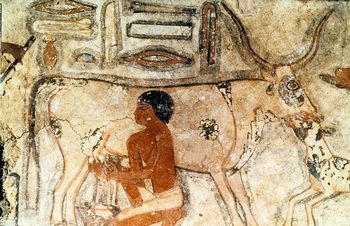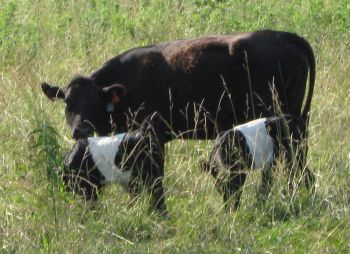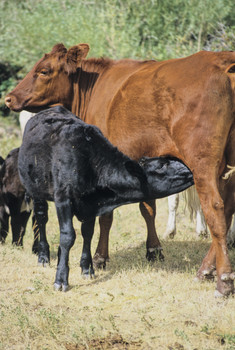Raising Missouri Pasture-Fed Beef
 While pasture
fed cattle have been in Missouri as long as the earliest settlers, this
is actually one of humankind’s oldest interests and occupations. The
ability to domesticate animals in order to provide a regular food
supply has determined civilization's rise and fall throughout our
histories.
While pasture
fed cattle have been in Missouri as long as the earliest settlers, this
is actually one of humankind’s oldest interests and occupations. The
ability to domesticate animals in order to provide a regular food
supply has determined civilization's rise and fall throughout our
histories.However, it is modernly as precise and specific as any other trade.
It isn't anything you can just start doing once you graduate high school. While you can always get a job as a "hired hand", there's a wide gulf of learning between being able to drive a farm truck to actually caring for and raising live animals - and a host of responsibilities you can't learn to shoulder from any text book.
 Most
who raise livestock have done so their entire lives, and have been able
to listen to their parents and grandparents, uncles, and aunts to glean
their experience in order to make it their own. However, any farmer can
tell you that every day out there is another one in the classroom. And
most farm living rooms are filled with books and magazines which tell
the new methods and techniques which are being tried.
Most
who raise livestock have done so their entire lives, and have been able
to listen to their parents and grandparents, uncles, and aunts to glean
their experience in order to make it their own. However, any farmer can
tell you that every day out there is another one in the classroom. And
most farm living rooms are filled with books and magazines which tell
the new methods and techniques which are being tried.In our farm, we are descended from a long line of farmers in every generation we've been able to trace.
In this section, we want to tell our story of what we've found workable and sustainable in order to both maintain this way of life and continue to provide you with the healthiest beef and produce available.
If you find you have questions as you go along, feel free to contact us on the form provided, and we'll see how fast we can get back to you. (If we spent all day at the computer, our cows and their calves wouldn't appreciate it much...)
Missouri Beef: Heathy is as Healthy Eats
 There's
a lot of misinformation out there about farming in general and beef in
particular. We keep our Missouri beef healthy and they can help you,
too.
There's
a lot of misinformation out there about farming in general and beef in
particular. We keep our Missouri beef healthy and they can help you,
too.All beef isn't the same. The quality of the beef changes not just from country to country, but from farm to farm and year to year. No two animals are identical and can't be raised that way. Each requires care to ensure they stay the healthiest they possibly can, being well-fed and watered even when Mother Nature decides a drought is due.
So this notion of a "factory farm" can't be further from the truth. I'm sure you've heard the horror stories or seen the videos. Truth is, there are bad apples in every barrel. And just because there is a handful of crooked accountants or shifty CEO's of corporations doesn't mean that all of them are that way. (The jury is still out on lawyers, politicians, and used car salespeople...) But animals are live things and cannot be run on any assembly line, any more than a mill can churn out puppies. They have to be individually cared for.
Beef is as healthy as you know where it came from, what went in it, and how it was processed. The meat you get from supermarkets is packaged to look as good as possible, right down to the colors of the packaging and what color lights they use. Doesn't mean it is going to make you fat or lean or somewhere in between.
And all we can really testify to is how our own cattle are treated, what they are fed, and what condition they were in as we sent them to be processed. If your concerned about your food safety, then you'll want to know this data, too.
This section will start to clue you in on some of the data we'd like to share with you about the cattle we raise and why we live such healthy lives from eating our produce - the same we'd like to sell you.
And if your mind is made up, we aren't going to try to change it. But if you find something interesting you didn't know before, please share it with your family and friends.
